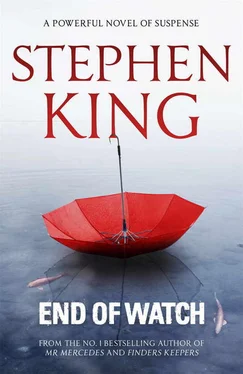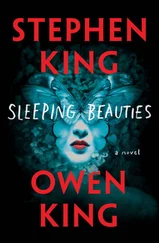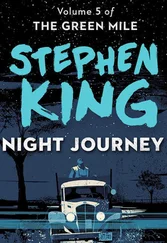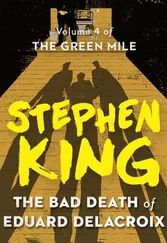Thousands were expected to show up.
After he started working the Cyber Patrol at Discount Electronix and could buy crunchers on the cheap, Brady wired together seven off-brand laptops in his basement workroom. He rarely used more than one of them, but he liked the way they made the room look: like something out of a science fiction movie or a Star Trek episode. He wired in a voice-activated system, too, and this was years before Apple made a voice-ac program named Siri a star.
Once again, a day late and a dollar short .
Or, in this case, a few billion.
Being in a situation like that, who wouldn’t want to kill a bunch of people?
He only got eight at City Center (not counting the wounded, some of them maimed really good), but could have gotten thousands at that rock concert. He’d have been remembered forever. But before he could push the button that would have sent ball bearings flying in a jet-propelled, ever-widening deathfan, mutilating and decapitating hundreds of screaming prepubescent girls (not to mention their overweight and overindulgent mommies), someone had turned out all his lights.
That part of his memory was blacked out permanently, it seemed, but he didn’t have to remember. There was only one person it could have been: Kermit William Hodges. Hodges was supposed to commit suicide like Mrs Trelawney, that was the plan, but he’d somehow avoided both that and the explosives Brady had stashed in Hodges’s car. The old retired detective showed up at the concert and thwarted him mere seconds before Brady could achieve his immortality.
Boom, boom, out go the lights.
Angel, angel, down we go.
Coincidence is a tricksy bitch, and it so happened that Brady was transported to Kiner Memorial by Unit 23 out of Firehouse 3. Rob Martin wasn’t on the scene – he was at that time touring Afghanistan, all expenses paid by the United States government – but Jason Rapsis was the paramedic onboard, trying to keep Brady alive as 23 raced toward the hospital. If offered a bet on his chances, Rapsis would have bet against. The young man was seizing violently. His heart rate was 175, his blood pressure alternately spiking and falling. Yet he was still in the land of the living when 23 reached Kiner.
There he was examined by Dr Emory Winston, an old hand in the patch-em-up, fix-em-up wing of the hospital some vets called the Saturday Night Knife and Gun Club. Winston collared a med student who happened to be hanging around the ER and chatting up nurses. Winston invited him to do a quick-and-dirty evaluation of the new patient. The student reported depressed reflexes, a dilated and fixed left pupil, and a positive right Babinski.
‘Meaning?’ Winston asked.
‘Meaning this guy is suffering an irreparable brain injury,’ said the student. ‘He’s a gork.’
‘Very good, we may make a doctor of you yet. Prognosis?’
‘Dead by morning,’ said the student.
‘You’re probably right,’ Winston said. ‘I hope so, because he’s never coming back from this. We’ll give him a CAT scan, though.’
‘Why?’
‘Because it’s protocol, son. And because I’m curious to see how much damage there actually is while he’s still alive.’
He was still alive seven hours later, when Dr Annu Singh, ably assisted by Dr Felix Babineau, performed a craniotomy to evacuate the massive blood clot that was pressing on Brady’s brain and increasing the damage minute by minute, strangling divinely specialized cells in their millions. When the operation was finished, Babineau turned to Singh and offered him a hand that was still encased in a blood-stippled glove.
‘That,’ he said, ‘was amazing.’
Singh shook Babineau’s hand, but he did so with a deprecating smile. ‘That was routine,’ he said. ‘Done a thousand of them. Well… a couple of hundred. What’s amazing is this patient’s constitution. I can’t believe he lived through the operation. The damage to his poor old chump…’ Singh shook his head. ‘Iy-yi-yi.’
‘You know what he was trying to do, I take it?’
‘Yes, I was informed. Terrorism on a grand scale. He may live for awhile, but he will never be tried for his crime, and he will be no great loss to the world when he goes.’
It was with this thought in mind that Dr Babineau began slipping Brady – not quite brain-dead, but almost – an experimental drug which he called Cerebellin (although only in his mind; technically, it was just a six-digit number), this in addition to the established protocols of increased oxygenation, diuretics, antiseizure dugs, and steroids. Experimental drug 649558 had shown promising results when tested on animals, but thanks to a tangle of regulatory bureaucracies, human trials were years away. It had been developed in a Bolivian neuro lab, which added to the hassle. By the time human testing commenced (if it ever did), Babineau would be living in a Florida gated community, if his wife had her way. And bored to tears.
This was an opportunity to see results while he was still actively involved in neurological research. If he got some, it was not impossible to imagine a Nobel Prize for Medicine somewhere down the line. And there was no downside as long as he kept the results to himself until human trials were okayed. The man was a murderous degenerate who was never going to wake up, anyway. If by some miracle he did, his consciousness would at best be of the shadowy sort experienced by patients with advanced Alzheimer’s disease. Yet even that would be an amazing result.
You may be helping someone farther down the line, Mr Hartsfield, he told his comatose patient. Doing a spoonful of good instead of a shovelful of evil. And if you should suffer an adverse reaction? Perhaps go entirely flatline (not that you have far to go), or even die, rather than showing a bit of increased brain function?
No great loss. Not to you, and certainly not to your family, because you have none.
Nor to the world; the world would be delighted to see you go. He opened a file on his computer titled HARTSFIELD CEREBELLIN TRIALS. There were nine of these trials in all, spread over a fourteen-month period in 2010 and 2011. Babineau saw no change. He might as well have been giving his human guinea pig distilled water.
He gave up.
The human guinea pig in question spent fifteen months in the dark, an inchoate spirit who at some point in the sixteenth month remembered his name. He was Brady Wilson Hartsfield. There was nothing else at first. No past, no present, no him beyond the six syllables of his name. Then, not long before he would have given up and just floated away, another word came. The word was control . It had once meant something important, but he could not think what.
In his hospital room, lying in bed, his glycerin-moistened lips moved and he spoke the word aloud. He was alone; this was still three weeks before a nurse would observe Brady open his eyes and ask for his mother.
‘Con… trol.’
And the lights came on. Just as they did in his Star Trek -style computer workroom when he voice-activated them from the top of the stairs leading down from the kitchen.
That’s where he was: in his Elm Street basement, looking just as it had on the day he’d left it for the last time. There was another word that woke up another function, and now that he was here, he remembered that, as well. Because it was a good word.
‘Chaos!’
In his mind, he boomed it out like Moses on Mount Sinai. In his hospital bed, it was a whispered croak. But it did the job, because his row of laptop computers came to life. On each screen was the number 20… then 19… then 18…
What is this? What, in the name of God?
For a panicky moment he couldn’t remember. All he knew was that if the countdown he saw marching across the seven screens reached zero, the computers would freeze. He would lose them, this room, and the little sliver of consciousness he had somehow managed. He would be buried alive in the darkness of his own hea—
Читать дальше











